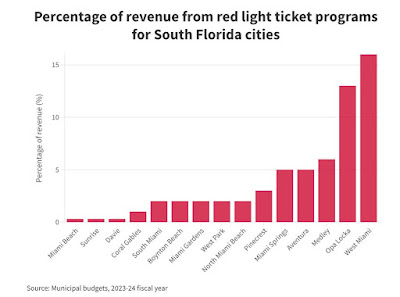Florida cities have long used red light cameras as a tool to promote traffic safety and reduce violations at dangerous intersections. These cameras generate significant revenue for local governments, funding various public services. However, the State of Florida is increasingly interested in obtaining a portion of this income, raising questions about the impact on local budgets and public safety initiatives. Here’s a look at why the state wants a share of red light camera revenue, what it means for Florida cities, and how it could affect residents.
Why Does Florida Want Red Light Camera Revenue?
As Florida continues to experience rapid growth and increased infrastructure needs, the state government is looking for additional funding sources to support statewide projects. Red light cameras, which are often positioned in high-traffic intersections, have become a lucrative source of revenue for municipalities. Here are some key factors driving the state’s interest:
- Expanding State Budget Needs: Florida’s population growth brings increased demand for statewide services, from road maintenance to public safety. A portion of red light camera revenue could help fund these initiatives.
- Centralized Traffic Safety Programs: State officials argue that redirecting part of the revenue could allow for more coordinated, statewide traffic safety efforts, helping fund programs that benefit all Floridians.
- Legal and Policy Pressure: Amid debates over the legality and fairness of red light cameras, the state is considering stronger oversight of these programs, potentially justifying a share of the revenue.
How Red Light Cameras Generate Revenue for Cities
Red light cameras are designed to capture images of vehicles that run red lights at intersections. When a violation is detected, the registered owner of the vehicle typically receives a citation in the mail, which carries a fine. These fines have become a significant revenue stream for many cities, as they fund:
- Local Traffic and Public Safety Programs: Funds often go toward traffic safety improvements, pedestrian infrastructure, and emergency response services.
- Maintenance of Red Light Camera Systems: Revenue from citations helps cover the cost of installing, maintaining, and upgrading red light camera systems.
- Community Projects and Services: Many cities allocate part of this revenue to support various community initiatives, from public parks to education programs.
Potential Impacts on Cities if the State Gains a Share
If Florida’s state government were to claim a portion of red light camera revenue, it could have several consequences for local governments and residents:
1. Reduced Funding for Local Programs
- Cities rely on these funds to maintain and improve their traffic infrastructure. With a portion diverted to the state, cities may struggle to keep up with local traffic safety needs, impacting everything from road maintenance to public safety.
2. Budget Constraints for Municipalities
- For cities that depend on red light camera revenue to balance their budgets, sharing this revenue with the state could create financial challenges. Municipalities might have to make cuts in other areas or find alternative funding sources.
3. Increased Public Scrutiny of Red Light Cameras
- As the state considers sharing in red light camera revenue, it could reignite debates about the fairness and transparency of these systems. Residents may question whether red light cameras prioritize safety or profit, leading to increased public scrutiny and potential pushback.
4. Impact on Traffic Safety Efforts
- Local control of red light camera revenue allows cities to directly invest in safety improvements where they are needed most. Shifting part of this revenue to the state could dilute the effectiveness of localized safety programs.
The Future of Red Light Camera Revenue in Florida
The push for state involvement in red light camera revenue is still under debate, with supporters arguing that it could benefit statewide traffic safety initiatives and detractors concerned about the impact on local autonomy. Lawmakers may explore options such as revenue-sharing agreements, which could require a portion of revenue to be allocated to specific statewide safety programs while allowing cities to retain some control.
What Florida Residents Should Know
As this debate unfolds, residents should be aware of the potential changes to red light camera programs and their impact on local budgets. If the state secures a share of this revenue, it could affect everything from traffic safety improvements to community resources funded by local governments.
Final Thoughts
The State of Florida’s interest in city revenue from red light cameras reflects a larger trend of state governments seeking new funding sources to meet growing demands. However, this approach comes with challenges and risks for local governments and residents. As the discussion continues, finding a balanced solution that supports both statewide initiatives and local community needs will be essential for maintaining Florida’s public safety standards and quality of life.











